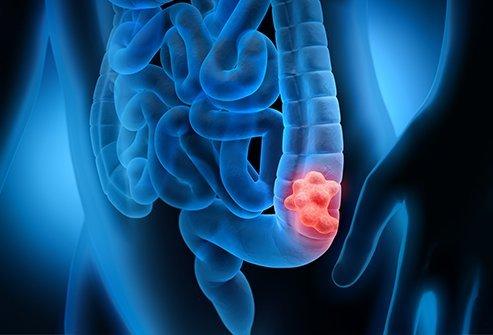As the second leading cause of cancer-related deaths in the United States, it's important to know the symptoms of colon cancer so you can do your best to catch it early, when it's most treatable. Some symptoms include cramping, belly pain, dark or bright red blood in your stool, or a change in your stool frequency, like persistent diarrhea or constipation. Whole-body symptoms, such as unintentional weight loss, loss of appetite, or unusual tiredness, may also occur in those with colon cancer.
Iron deficiency anemia and jaundice, which are complications of colon cancer, can also develop.
Research has shown that there is a significant delay between when people first notice signs of colon cancer and when it is actually diagnosed. This lag time could result in colon cancer spreading further, which lowers the chance of successful treatment.
While it's true that most people with these symptoms do not have colon cancer, it's never safe to assume that's the case.
Anatomy
To better understand colon cancer symptoms, it helps to briefly review the anatomy of the colon.
The colon makes up most of the large intestine, which is approximately 6 feet in length; the last 6 inches or so are made up of the rectum and anal canal. Many people think of the small intestine as being on top and the large intestine as being down below, but there is actually overlap, and much of the large intestine lies above the small intestine.
The ascending colon travels up the right side of your abdomen, the transverse colon travels horizontally across your upper abdomen, and the descending colon travels from just under your ribs on the left, down to the rectum and anus.
Frequent Symptoms
In the early stages of colon cancer, people often have no symptoms. This is why regular screening beginning at age 45 (and earlier for those with risk factors) is an important investment in your health.
The symptoms mentioned below by no means point directly to colon cancer. In fact, they could indicate another problem in the bowels, such as an infection (for example, acute diverticulitis), ulcers, or inflammation (for example, Crohn's disease). This is why seeing your healthcare provider is critical.
Colon cancer symptoms come in two general varieties: local symptoms (based on where the tumor is located) and systemic symptoms (involving the whole body).
Local colon cancer symptoms affect your bathroom habits and the colon itself. These symptoms can include:
If gas and bloating are related to colon cancer, they tend to be late symptoms caused by an obstructing tumor in the colon. Bloating may also occur as a result of cancer spreading to nearby lymph nodes.
If nausea and vomiting are accompanied by other worrisome signs—such as constipation, abdominal cramping, and/or abdominal distension—colon cancer could be a cause.
Nausea and vomiting may occur at any stage of colon cancer but are more common with advanced disease. It's important to remember that the occurrence of nausea and vomiting alone, without other colon cancer symptoms, is not likely an indication of cancer.

The nature of a bowel movement change can be described in the following ways:
Systemic colon cancer symptoms are those that affect your whole body. These symptoms may include:
Unexplained weight loss is described as losing 10 or more pounds or at least 5% of your body weight over a six- to 12-month period. For example, if you are a 150-pound person who lost 7.5 pounds in a year for no apparent reason, you should contact your healthcare provider.
Rare Symptoms
If colon cancer is not diagnosed until its advanced stages, it may cause one or more of these symptoms:
Complications
Complications of colon cancer may include:
While a nasogastric tube may be placed temporarily to reduce swelling and remove the fluid and gas buildup of a bowel obstruction, surgery to remove the obstructing tumor or a stent placement (to open up the blocked area) is often required.
When to See a Healthcare Provider
While many people have heard that having blood in their stools may be a sign of colon cancer, just about any change in your bowel habits is worth evaluating. While you may be anxious about the possibility of having colon cancer, early diagnosis offers you the best opportunity for successful treatment. There is a possibility that something else entirely is going on—something less serious than cancer.
Get our printable guide for your next healthcare provider's appointment to help you ask the right questions.
Download PDFEmail the GuideSend to yourself or a loved one.
This Doctor Discussion Guide has been sent to {{form.email}}.
There was an error. Please try again.
Learn More:Causes and Risk Factors of Colon CancerColon cancer is often asymptomatic in the early stage, especially if the tumor is higher up in the colon. When early symptoms do develop, they often include:
Because colon cancer can cause the narrowing of the intestinal tract, thin, pencil-like stools are common. The tumor can also cause bleeding, leading to stools that range in color from a dark red or maroon to a tar-like black.
Learn More:What Do the Different Poop Colors and Shapes Mean?If your healthcare provider suspects you may have colon cancer based on symptoms and tests results (including the fecal occult blood test), a colonoscopy will be ordered to look inside the colon. During the procedure, a biopsy of abnormal polyps or tissues will be obtained and sent to the lab for evaluation.
Colon cancer usually forms from a cluster of benign cells called an adenomatous polyp. While most of these polyps won't become malignant (cancerous), some can slowly turn into cancer within 10 to 15 years. Other types of colon cancer are more aggressive and may progress more rapidly.
Colon cancer is the fourth most common cancer and the second leading cause of cancer-related deaths in the United States. Nearly 150,000 people get colon cancer each year, while over 50,000 die of the disease annually.
Unlike some cancers, there are steps you can take to reduce your risk of getting colon cancer, including:
Limiting processed foods and red meats can help ward off cancer risk. These recipes focus on antioxidant-rich foods to better protect you and your loved ones. Sign up and get your guide!
You're in!Thank you, {{form.email}}, for signing up.
There was an error. Please try again.









